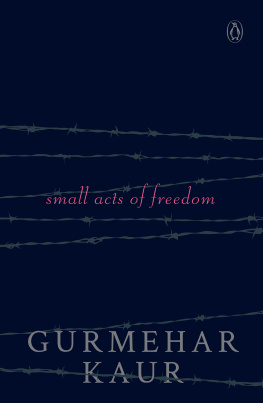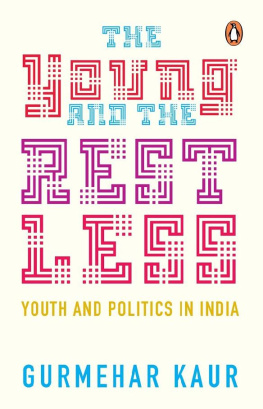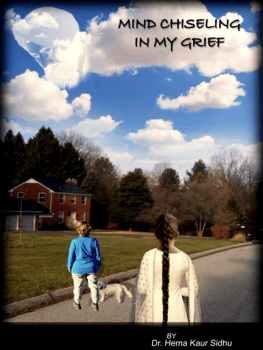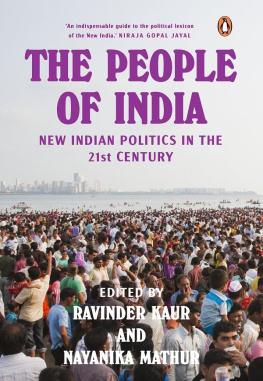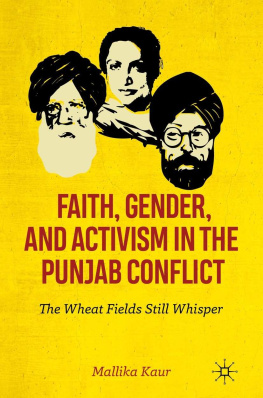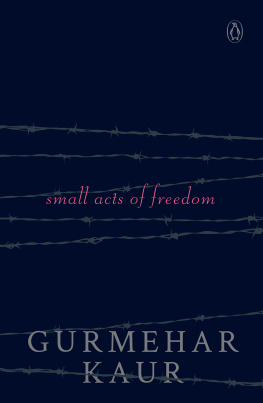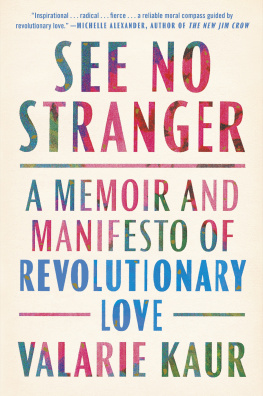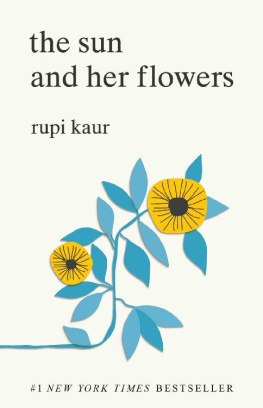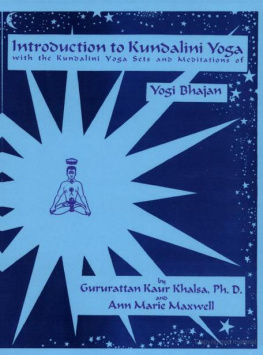Gurmehar Kaur is an Indian student activist and the ambassador for Postcards for Peace, a charitable organization that works towards eliminating discrimination. She is also the co-founder of Citizens for Public Leadership, an independent and non-partisan movement focused on advocating progressive public policy in India. In October 2017, she was listed by TIME magazine as a global Next Generation Leader. Small Acts of Freedom is her first book.
Introduction
In February 2017, a few friends asked me if I wanted to join them for a protest at Ramjas College. I said no. I did not know what it was about. I wish I had known then what I know nowthat they were protesting against campus violence, that all they wanted was the right to conduct a seminar on Cultures of Protest. Little did I know how important peace activism and protest culture would turn out to be for me in the months to come. At the time, as a student of Lady Shri Ram College, I had only heard bits and pieces here and there, read a few social media status updates and seen a few articles. I had attended a few events in the past in the Delhi University activism circuit, so it didnt come as a surprise that they expected me to go. I had been very vocal in college, always engaging in political conversations and debate, but that day I had a lot on my mind.
Earlier in February, I had had a falling-out with a few friends I deeply cared about and loved. I was still nursing the wounds and dealing with the emotional drama that came along with it. All of this was during the final month of the semester, when we were supposed to submit our assignments. I loved my course, so I buried myself under reading assignments and worked to avoid thinking about my personal dilemmas. Why am I telling you about my personal problems? Its because I want you to know that I was living an ordinary life, a teenagers life. My head was full of gossip and clothes and trends and books and other things you might expect me to be occupied with. I dont feel like that girl any more. Today, I think about censorship and freedom of expression; I think about liberalism and online abuse; I think about the state of our nation far more frequently than I ever did in those days.
With my exams coming up, the Ramjas College fest was the last thing on my mind. In fact, after a rough time at our own fest that year, I wanted to run away as far as I could from the word itself. I had my own problems. Ramjas can sort out its freedom of expression issue on its own, I thought, and left to get a coffee. My best friend joined me and we sat to do our work. Every so often, wed chatter about college gossipwho was doing what, who was standing for which post on the students union, whom we should vote for and if the previous union was corrupt or not. Our phones were on airplane mode because both of us knew that there was no way we could finish our work if there were Instagram and Facebook notifications begging us to glance at our phones.
That evening, when we got back to our rooms and turned off airplane mode, our phones started buzzing with WhatsApp messages. What was going on? Why was everyone panicking? My phone was flooded with harrowing pictures of violence. These were not pictures that were being circulated by the mediawho tended to blow things out of proportion anywaybut those that were being sent to us, in real time, by our own friends who were there.
It all happened in a blur. The studentswho had been peacefully protesting to condemn the campus violence involving the Akhil Bharatiya Vidyarthi Parishad (ABVP)were roughed up. There were long messages telling us what had happened and asking if any of us could shelter the injured girls. But as is the case with most college hostels, no one could enter our hostel after a certain hour. I was told that students were lathi-charged at the protest and herded into police vans like sheep. Then they were taken to a metro station and left there.
I felt anger, closely followed by overwhelming helplessness. What could I have done, sitting in my hostel, honouring a curfew of 8.30 p.m.? How could I help when I could not even go out, I kept wondering. This wasnt just breaking news on TV, these were injustices happening to my own friends. It is so easy to dismiss the bad in the world when it is playing on your TV screens like a movie. You start to think its all fiction but it never is. It is happening somewhere in the world, to real people, and this time it was happening to people that I knew, people that I saw in my college every day, laughing and smiling.
How does one ignore something like this?
I took a piece of paperone side of which, in fact, had notes from the previous semesterand two different coloured pens. Red and black. My friend wrote down the message we had just sat together and framed. I stood with my back to the white wooden door, holding up the sheet as my friend clicked a picture. It was uploaded with a caption on my Facebook profile page.
This is what the placard said: I am a student from Delhi University. I am not afraid of ABVP. I am not alone. Every student of India is with me. #StudentsAgainstABVP.
So what really happened at Ramjas? The truth is, after that picture was uploaded, no one cared to find out.
All of a sudden, I became the focus of a conversation I had not even started in the first place. No one could have predicted the events that followed. I became coloured by the narratives people imposed on me: I was the girl with the placard, but I was also the anti-national, the martyrs daughter, the student activist.
It was an easier conversation to have than the one that was actually at hand. It was comfortable to overlook the tamasha of rape, death threats and nationalism and focus on a college girl and her Facebook profile picture instead. Theythe people who suddenly became furious with medidnt care about what the placard read, they cared about who held it. Students from one of the top colleges in India were pelted with stones, hurt, manhandled; women were groped, teased and sent anonymous threats; but I understand why the nation wasnt having this conversation. It was too difficult. We would rather shut our eyes than be witnesses to this violenceit helps us sleep in peace.
Im not someone who always speaks up about everything. Im guilty of it too. Even as I write this, there is so much going on in the world that I havent spoken about that it seems futile sometimes, just talking, saying something just for the sake of talking. But that day, after hearing about my friends being manhandled, silence did not seem like an option. I could not have walked into my college and looked my friends in the eye. I had lucked out when I said no to them that afternoon, I had escaped the violence, and now guilt was creeping up on me.

What happened at Ramjas College? My friend, who was present there, told me her story. She doesnt want to be named, and understandably so. Who would want to go through what I had to simply because I spoke up?

